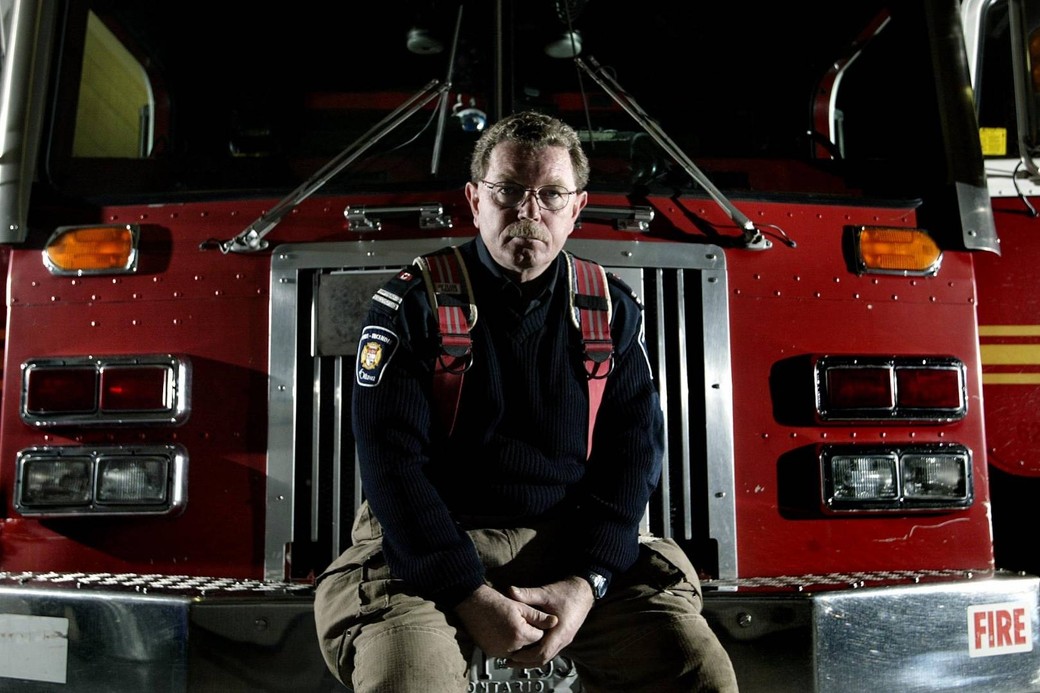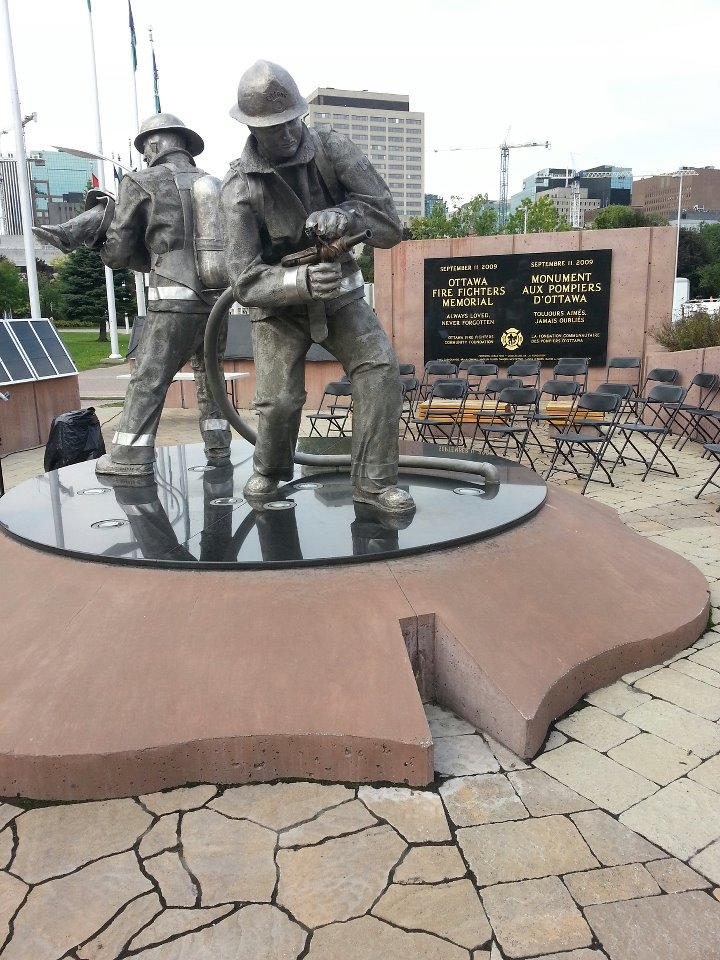
A Hero’s Hero
by Shauna Quinn
“For every action, there is an equal and opposite reaction.” – Isaac Newton
When people speak of unsung heroes, they are speaking of someone who looks a lot like Barry Quinn, a former firefighter whose efforts, dedication and sacrifices helped improve the lives of his fellow firefighters immeasurably.
He was a happy soul known for his sense of humor. His happy-go-lucky attitude and positive approach to life were inspiring. His smile was devilish yet contagious. His laugh was infectious. Somehow, he could bring sunshine to the darkest of days.
Barry was a good husband, a dedicated father of two and little league baseball coach, but he was also the vice-president and secretary-treasurer of the Ontario Professional Fire Fighters Association (OPFFA) District 2.
“He was one of those lucky people who knew what their purpose in life was,” said Cheryl Quinn, his wife of 34 years. “His was to fight for his fellow firefighters.”
No stranger to the deadly world of cancer, Barry was 27 when he lost his mother to the disease. She was 52. This was his first of many encounters with this killer.
Many associations issue reports indicating cancer is steadily increasing among firefighters. The OPFFA has been collecting the names of sick, dying and dead firefighters since 1999. Estimates out of the data show two-thirds of firefighters will be diagnosed with some form of cancer in their lifetime. Among the general population, that number is closer to one third.
“Barry was a strong voice,” said Fred Leblanc, 13th District Vice-President of the International Association of Fire Fighters. “He played a key role in respect to our overall strategy and lobby.”
Fred and Barry led a team of occupational disease committee representatives in an initiative with Steve Peters, then Ontario Minister of Labour.
Barry’s knowledge and background regarding Ontario’s Workplace Safety and Insurance Board (WSIB) – along with his experience representing the members in Ottawa suffering from various cancers – proved to be an invaluable asset.
The Ontario legislature unanimously passed Bill 221 in May 2007. The Bill passed all three readings on the same day in a very rare move of all-party support. The Minister of Labour could now create or amend regulations that outline occupational diseases presumed to have been contracted by professional, part-time, volunteer and forest firefighters.
In June 2007, regulations were established that covered eight cancers including brain cancer, bladder cancer, kidney cancer, colorectal cancer, non-Hodgkin’s lymphoma, leukemia, ureter cancer, esophageal cancer and heart injury.
The most significant part of this legislation was that it allowed the minister to make these changes retroactively, unheard of in WSIB legislative amendments, as the legislation was applicable to cases dating back to January 1, 1960. Firefighters who passed away from these cancers are now honored as having died in the line of duty and their families will receive some belated but important compensation. Ontario’s legislation is groundbreaking in Canada.
Firefighters face a multitude of hazards as they carry out the occupational requirement of saving lives and reducing property damage. Even with premium respiratory practices and protective equipment, exposures to toxic elements are inevitable due to absorption through the skin when a firefighter becomes soaked during fire suppression operations.
Science continues to establish a direct relationship between firefighting and occupational disease, although it is extremely difficult to link chemical exposure and sickness. This connection is hard to prove because no two firefighters are exposed to the same mixtures of chemicals. Every firefighter has a different medical history and it may be years between exposure and diagnosis of illness. That certain illnesses, such as prostate cancer, occur regularly in the general population makes it that much more complicated.
There is still much work to be done for firefighters. Many have been diagnosed with certain cancers that are not automatically covered by the legislation and the families left behind do not receive compensation. Currently, there are five cancers not included in the legislation: lung cancer, breast cancer, testicular cancer, skin cancer and prostate cancer.

Tom Quinn, a retired Fire Captain from the former City of Nepean, is part of a group of firefighters known as the Nepean “cluster.” This is a large group of firefighters from the former Nepean department who have been diagnosed with cancer. The only common denominator is that each firefighter in this group worked at some point out of the Viewmount Station. Tom was Captain out of this station for more than five years. He is also Barry’s older brother.
Tom was diagnosed with prostate cancer in 2002. After taking medical leave, he retired in March 2003, after 32 years’ service. In 2005, he was declared cancer-free.
“I am more than proud of Barry for all he has done for our brothers and sisters in the fire service,” Tom said. “You couldn’t have found a better man for the job.”
Because of Barry, our fallen heroes are now honored as such. When it came time to honor the fallen, he was meticulous. Everything needed to be perfect. He often referred to them as “his families” and he treated them as such.
“It takes a very special person to be able to relate to families dealing with tragic circumstances,” Fred said. “Barry had a unique gift in this regard.”
Barry always made families understand that he cared. He gave them his shoulder, and the shoulders of fellow firefighters, to cry and lean on. Somehow, he made it easier for them to cope.
“He would work tirelessly to ensure that they left this earth with dignity and grace,” Cheryl said. “No one but us saw what a toll advocating for firefighters with cancers did to him. He was with the firefighter until the very end, being a strong and fighting presence. Then he would come home and break down into tears for the firefighter and his family.”
Not everyone understands exactly what it means to lobby for something; nor will everyone comprehend the massive amount of time and dedication it takes to develop and apply new legislation. But one thing everyone should understand is that firefighters risk their lives helping others as part of the job. Now they are dying for doing their job.
Investigations and inquiries were set in motion. Doors were forced open, thanks largely to research brought forth by Barry. Thanks to his hard work and dedication, research will continue and will further establish the effects of chemical exposure and occupational hazards of firefighters.
But Barry‘s part in the battle ended. On the morning of June 16, 2012, the day before his son would celebrate his first Father’s Day, Barry suffered a massive heart attack. He died almost instantly. He was 56.
His life was celebrated by firefighters from across the province. His name has been added to the Ottawa Fire Fighters Memorial.
To honor his memory, and to recognize his love of baseball, this June the Second Annual Ottawa Fire Fighters Baseball Tournament and BBQ will be renamed the Barry M. Quinn Memorial Tournament.
“We have decided it’s appropriate to name the tournament after Barry,” said Cassandra Greer, executive board member of Local 162 of the Ottawa Professional Fire Fighters Association and tournament organizer. “Barry was a family man first and loved the brotherhood of the firefighters. This would serve as a yearly reminder of all the work and dedication this man has given to all of us. It will also remind us to take time out to enjoy each other doing a sport that he also devoted much of his time and effort to.”
More than 200 firefighters are anticipated to participate in this year’s tournament, including retired members and their families. Another 200 are expected for the family BBQ.
“When I think back, I can sum up Barry in this way,” Fred said. “He was a drop everything, do anything kind of guy who always left you laughing. When you think about it, that is an incredible legacy.”









